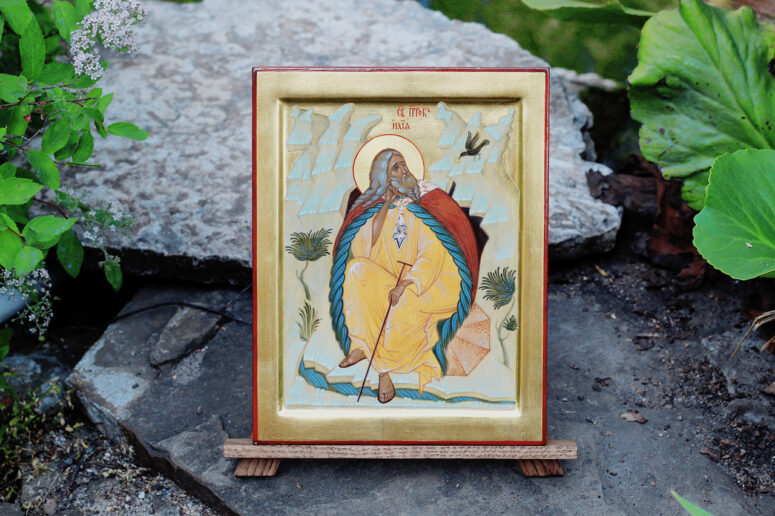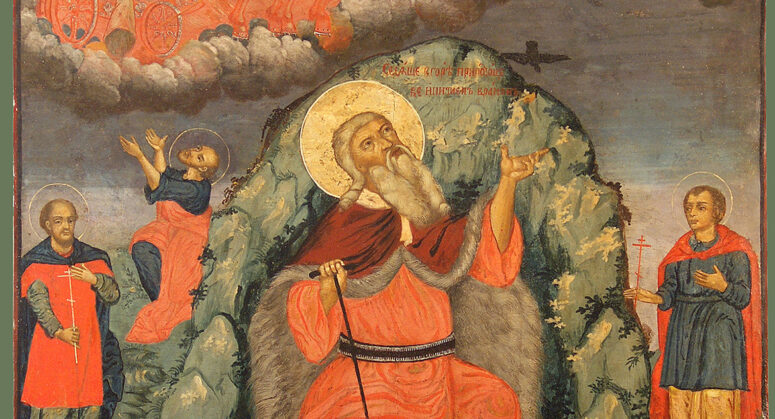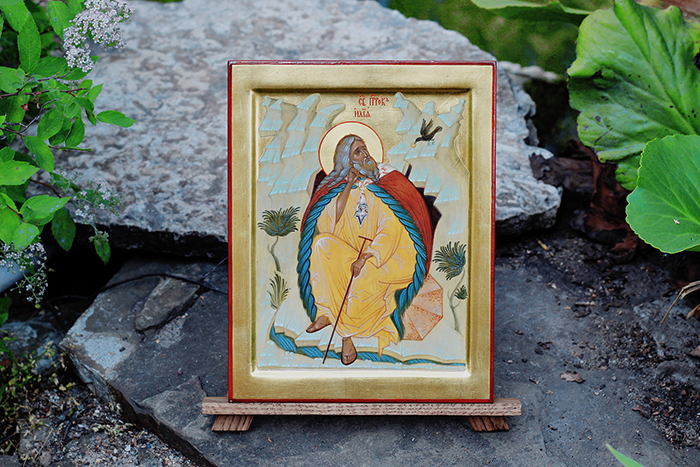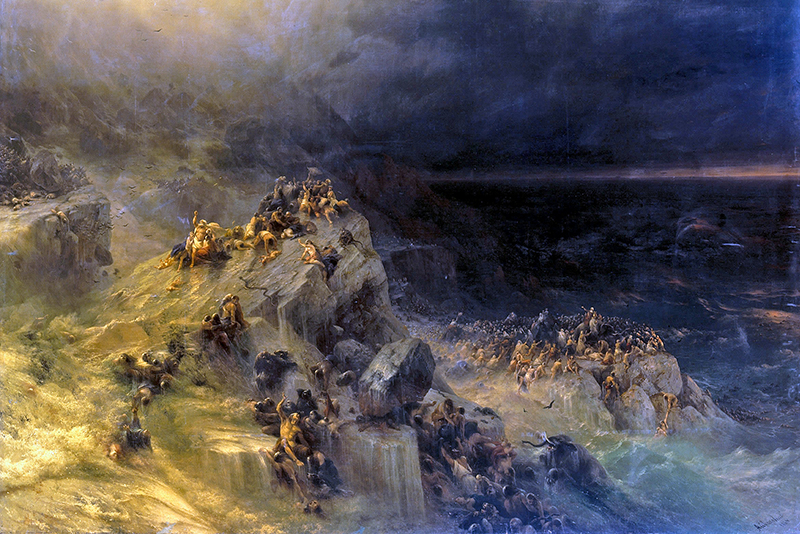
Elijah is one of the most revered prophets in the Russian Church. But unlike Isaiah, Jeremiah or Daniel, he left us no books or even striking prophecies! Then what is his authority based on?
Back in pre-Mongolian times in Russia there were several temples in honor of Elijah the Prophet. There are numerous folk sayings and proverbs like the famous “Elijah the Prophet takes two hours away” or “Since Elijah Day the water gets cooler” associated with the name of this Old Testament saint. All of this indicates that the Russian people revered Elijah very much.
Certainly, it is worth bearing in mind that people in Russia for a long time maintained their pagan traditions, and Elijah who had ascended to the sky in a chariot of fire, was often approximated to the image of Perun, the Slavic god of thunder. Until now, you may hear: “Elijah the Prophet is driving his chariot of fire” when thunder rumbles.
Such forms of “veneration” of this saint, of course, are very far from Christianity… Especially if you remember how irreconcilable the real Prophet Elijah was to idolatry and various superstitions that infested the Israelites in that era (9th century BC).
However, the love for the Prophet Elijah is not a unique feature of the Russian Church. He is revered by Christians around the world. After all, the name of this fiery preacher of the One True God is mentioned in the New Testament as frequently as the name of Moses, who gave people the Law of God. Moreover, both Elijah and Moses personally participated in one of the events of the Gospel history: they appeared on Mount Tabor and talked to the transfigured Lord about the death on the cross awaiting Him (Matthew 17:1-6, Mark 9:1-8, Luke 9:28-36).
Of all the righteous people of the Old Testament, the Lord granted a conversation on Mount Tabor only to two of them – Moses and Elijah.
It seems clear why Moses was one of the two. Moses was the only Israelite to speak to God face to face; he led the Israelites out of Egypt, where they were slaves, into the Promised Land; he wrote the first five books of the Bible… The Scripture calls him the meekest of all men on earth (Numbers 12:3).
Elijah’s temper was much tougher. Having won the competition with the pagan priests on Mount Carmel and having clearly shown the people that they should rely on the One True God, he personally dealt with all his opponents (1 Kings 18:20-40). The other time he led a fire from heaven onto the guards who showed up to take him to the royal palace (2 Kings 1:5-15). It doesn’t look like meekness and mercy, does it?
Then why did he find himself as God’s interlocutor on Tabor? Someone who has read the Bible carefully might even say: It would be understandable if, for example, the Prophet Isaiah, who is commonly called the “Old Testament Evangelist” became such a companion: there are so many prophecies about Christ in his book. Isaiah described the suffering of the Lord on Calvary in such detail as if he himself was standing by the Cross (though he had lived more than 700 years prior to these events). Or it might have been the Prophet Daniel: both the time of the coming of the Son of Man in the world, and even his physical appearance, were revealed to him…

What about the Prophet Elijah? There are no scriptures left of him; it is not even clear what kind of prophecies he was saying!
Here it is necessary to remember that a prophet is not necessarily a foreteller or author of some texts: John the Baptist, for example, did not leave us any writings, but the Lord called him the greatest of the prophets born by women (cf. Luke 7:28). A Biblical prophet is a man who speaks to the people on behalf of God, proclaiming His will. This is exactly what Elijah the Prophet did.
He urged his contemporaries to stop pretending to worship God, while at the same time making sacrifices to Baal: How long halt ye between two opinions? if the Lord be God, follow him: but if Baal, then follow him (1 Kings 18:21).
We know from the Book of Malachi and the four Gospels that it shall be Elijah who will return to the world prior to the Second Coming of the Lord Jesus Christ and he shall turn the heart of the fathers to the children, and the heart of the children to their fathers (Malachi 4:6). According to Alexander Lopukhin, a professor of Saint Petersburg Seminary, it means that Elijah will be called to “level the abyss that separates the holy God the Judge from the sinful people.”
The Book of Revelation of St. John the Theologian reads that in the last days, when the whole world will submit to the power of the Antichrist, “two witnesses” will appear in Jerusalem, who will prophesy for one thousand two hundred and sixty days and have the power to shut the sky so that it would not rain on the earth in the days of their prophecy, and have the power over the waters to turn them into blood, and to smite the earth with every pestilence they want (Revelation 11:3-6). John the Theologian did not name these prophets who will proclaim Christ to the world in the days of worldwide apostasy. One of them, however, is most definitely Elijah the Prophet, and the authoritative interpreters of the Book of Revelation unanimously confirm this. He was the one who once shut the sky so that it did not rain on the earth, but three and a half years later he prayed, and the dried up earth again received life-giving moisture (1 Kings 17:1-7; 18:1-45).
The Prophet Elijah, who ascends to heaven in a chariot of fire and returns to earth with a sermon of fire at the end of world history, is one of the key figures linking the Old and New Testaments together.
Why was Elijah such a “connecting link”?
Maybe because this prophet has two important features combined.
First, selfless allegiance to God and the desire to preach Him zealously. Second, a unique sensitivity to God’s word. The First Book of Kings tells how Elijah, hiding from the wrath of Queen Jezebel, sought a meeting with God on Mount Horeb. The Lord’s apparition was accompanied by various natural signs: a strong wind, an earthquake, and a fire, but Elijah knew: nothing of it was a manifestation of God Himself. At the same time, the prophet perceived something else, similar to a gentle wind (a still small voice). It was the Lord (1 Kings 19:11-12).
The still small voice would have gone unnoticed for every outsider. However, Elijah recognized his Lord and spoke to him. This ability to hear God through the noise and rumble of the world is probably the main reason why Christianity values the Prophet Elijah so much.
Translated by The Catalogue of Good Deeds
Source: https://foma.ru/pochemu-imenno-prorok-ilija-byl-s-gospodom-vo-vremja-preobrazhenija.html







Thank you for this post. Holy Prophet Elijah pray for us.